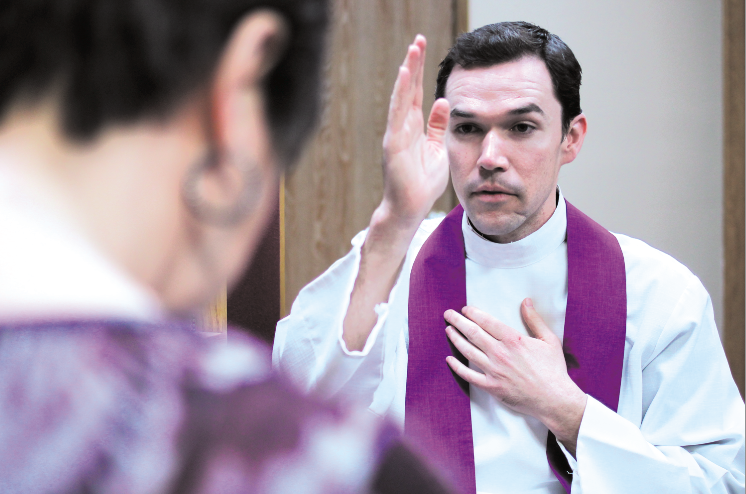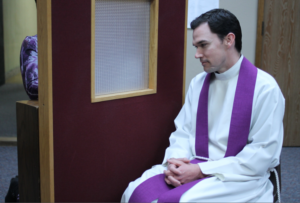
[quote_box_center]
Article in Spanish * Artículo en español
[/quote_box_center]
An invitation by the Holy Father invites Catholics around the globe to discover God’s mercy and extend forgiveness to others.
The Extraordinary Jubilee of Mercy proclaimed by Pope Francis is an opportunity to reflect on God’s mercy for all humanity.
“Our Holy Father called us to a Year of Mercy, a year of reaching out and loving someone — knowing what they’ve done, or haven’t done — and loving them through it,” said Sr. Colleen Braun, CSA, director of faith formation at St. Benedict Parish in Ahwtaukee.
[quote_box_right]
24 Hours for the Lord
What: One parish in each deanery will host 24 hours of Adoration and Confessions
When: March 4-5
East Deanery
- St. Anne Parish
440 E. Elliot Rd., Gilbert
5 p.m., March 4 – 5 a.m., March 5
North Deanery
- St. Francis of Assisi Parish
216 Cook St., Bagdad
9 a.m., March 4 – 11 a.m., March 5 - St. Joseph the Worker Parish
900 W. Grant Ave., Williams
6 p.m., March 4 – 5 p.m., March 5 - San Francisco de Asís Parish
1600 E. Rt. 66, Flagstaff
8 a.m., March 4 – 11 a.m., March 5 (at Nativity) - Sacred Heart Parish
150 Fleury St., Prescott
8 a.m., March 4 – 9 p.m., March 5 - St. Mary Parish
302 E. Spring St., Kingman
8 a.m., March 4 – 4 p.m., March 5 - Our Lady of the Lake Parish
1975 Daytona Ave., Lake Havasu City
7 p.m., March 4 – 5 p.m., March 5 - St. Margaret Mary Parish
1691 N. Oatman Rd., Bullhead City
9 a.m., March 4 – 5 p.m., March 5 - La Santisia Trinidad Mission
3735 Scenic Blvd., Mesquite
6 p.m., March 4 – 4:30 p.m., March 5 - Immaculate Conception Parish
700 N. Bill Gray Rd., Cottonwood
9 a.m., March 3 – 5 p.m., March 5
Central Deanery
- St. Mary’s Basilica
231 N. Third St.
1 p.m., March 4 – 1 p.m., March 5 - St. Thomas the Apostle Parish
2312 E. Campbell Ave.
5 p.m., March 4 – 5 a.m., March 5
Southwest Deanery
- Our Lady of Guadalupe Chapel, Phoenix
5 p.m., March 4 – 5 p.m., March 5
Northeast Deanery
- St. Joan of Arc Parish
3801 Greenway Rd., Phoenix
9:30 p.m., March 4 - Blessed Sacrament Parish
11300 N. 64th St., Scottsdale
March 4 – 5
South Deanery
- Our Lady of Mount Carmel Parish
2121 S. Rural Rd., Tempe
6 p.m., March 4 – 5 p.m., March 5
Info: ohmercy.org
Examination of conscience (broken by age range and state of life)
First Friday Mercy Nights 6-9 p.m.
The diocese is hosting evenings of Adoration, Confession, worship and a brief reflection.
March 4 — St. John the Baptist, 5407 W. Pecos Road, Laveen. Info.
April 1 — Immaculate Conception, 700 N. Bill Gray Road, Cottonwood
May 6 — St. Joan of Arc, 3801 E. Greenway Road, Phoenix
June 3 — Christ the King, 1551 E. Dana Ave., Mesa
Aug. 12 — St. Thomas Aquinas, 13720 W. Thomas Road, Avondale
Oct. 7 — Corpus Christi, 3550 E. Knox Road, Phoenix
[/quote_box_right]
“When I am aware that I need God’s mercy, I believe I can be more merciful to others,” she said.
The Church offers the sacrament of Reconciliation as a means of intimately experiencing God’s mercy and receiving grace.
This healing sacrament is three-fold: penitents confess their sins to a priest who represents Christ; they are reconciled to God and their brothers and sisters through the healing words of absolution; and the priest assigns a penance on God’s behalf to help the penitent grow in holiness.
“When we come to understand any time we do something that strains our relationship with God — talking about someone, not being charitable — that’s a sin and we need reconciliation,” Sr. Colleen said, adding, “All our sins affect other people.”
The biblical reference is documented in Sacred Scripture. John writes how Jesus empowers His disciples to forgive the sins of others in His name.
“… He breathed on them and said to them, ‘Receive the Holy Spirit. If you forgive the sins of any, they are forgiven them; if you retain the sins of any, they are retained’” (Jn 20:21-23).
Other stories reveal God’s mercy through the words of Jesus in parables such as the Prodigal Son, the Good Samaritan and the Lost Sheep.
“Once we receive the sacrament of Reconciliation, sin is not in the way anymore,” said Fr. Zygmunt Mazanowski, parochial vicar of St. John the Baptist Parish in Laveen and St. Peter Parish in Bapchule and their respective missions on the Native American reservations. “Jesus’ ultimate goal is to help us be in deeper relationship with Him. The sacrament helps facilitate that because sin is the number one thing that keeps us from that relationship.”
Confessing sin is central to the reconciliation process. The penitent must be truly sorry and attempt to repair the damage sin has done.
“We encounter God the Father when we repent. His arms are always open; wanting to receive us, wanting to forgive us, wanting to love us,” Fr. Mazanowski said, “and reconciliation allows that to happen.”
Reluctance to go to the confessional is often due to feelings of embarrassment, shame, guilt or unworthiness.
“God’s mercy is greater than your sin,” said Fr. Don Kline, pastor of St. Joan of Arc Parish. “Sin hurts people physically, emotionally, spiritually and psychologically. People suffer from tremendous guilt and they don’t have to feel that shame. Confession is an opportunity to hear those words of forgiveness from Christ.”
The sacrament of Reconciliation is closely associated with Lent, where Catholics are called to try harder and come closer to God.
Pope Francis has designated a worldwide “24 Hours for the Lord” of Adoration and Confession on March 4-5, the Friday and Saturday preceding the fourth week of Lent. One parish in each deanery of the Diocese of Phoenix will host “24 hours for the Lord.”
The diocese is also hosting First Friday Mercy Nights with the Franciscan Friars. Moving to a different parish each month, it’s a night of worship, Adoration of the Blessed Sacrament, a reflection and Confession.

The Year of Mercy isn’t limited to Lent, but instead calls Catholics to contemplate the mystery of mercy each day. St. Thomas Aquinas defines mercy as having compassion for someone who is suffering, or having pity for someone who is miserable.
“Showing mercy in this way is an act of love, and St. Thomas says, it’s the greatest act of mercy you can show another person,” Fr. Mazanowski said.
The Church commits to works of mercy, which are charitable actions that aid our neighbor’s spiritual or bodily needs.
As the hands and feet of Christ, the faithful can come to a deeper understanding of God’s love and mercy for themselves and others.
“It’s not a list of things to do, but simply a way to be,” said Fr. Thomas Hallsten, pastor of Holy Spirit Parish in Tempe. “Our soul longs for God … and we have an innate desire to know God.”






